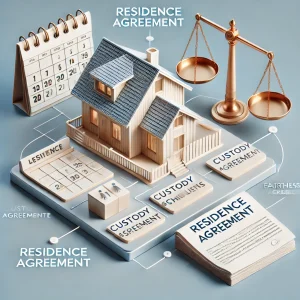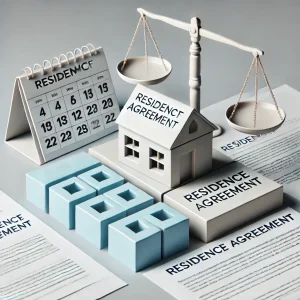Residence arrangments | Divorce proceedings are not a pleasant thing and in many cases they even come in jarring tones, and it is not certain that both parties wanted it in the first place.
Divorce involves quite a few feelings and emotions because of the reasons for divorce that can be: Injury of one spouse to the other spouse What creates in the other spouse will create revenge, and can cause quite a few complications due to joint assets and the like. But sometimes spouses who come to divorce proceedings forget that there is something else important and that is the children, or rather they of course remember their children but forget that they are the main victims of it.

Arrangements that were are arrangements that relate to the division of parents’ time spent with the children. In a divorce proceeding there is one party who “accepts the children to him” (custody), and a other party who receives the right to see them. In most cases the children are with the mother and only in cases where there is a fear of violence or the mother cannot raise them herself will the children move into the custody of their father. The usual stay arrangements between the father and the children are twice a week including accommodation and every second weekend. A divorce lawyer is the one who represented the non-custodial party in the request for stay arrangements or the custodial party in the claim for enforcement of existing arrangements.
A divorce lawyer represents the party who receives the arrangement that was, and there are arrangements that are generally acceptable. These arrangements talk about twice a week that the child is with the one who has not received custody, and after a few hours as agreed he returns them to the other side or he stays with him until the morning. If the child is already going to school the agreement will most likely include his transportation to school. Saturdays are usually one with the father and one with the mother, and holidays are also usually with the father and mother equally and alternately or the spouses decide otherwise. The more the couple thinks about the well – being of the children, the better for everyone and so the children will live with security on the part of their parents. Eventually everyone will benefit if the atmosphere between the parents is better.
Many married couples decide at some point in their lives to separate, even when they have children in common. The issue of children in divorce is complicated, because although it is usually not good for children to live in a home where there is no mutual love and respect between the parents, the breakup of the relationship also hurts the children, not only emotionally but also technically. And two parents, who were once one unit. The issue of child custody is complicated, especially in recent years. While in the past it was clear that the mother is the one who raises the children, today many fathers are fully and intensively involved in raising the children. Therefore the hearing on child custody should be conducted on the merits and according to the circumstances of the specific case.
The presumption of infancy stipulates, even today, that children up to the age of 6 are automatically in the custody of the mother. But this is subject to change, if the mother is unable to raise her children, and in contrast, if the parents agree on joint custody. When the mother receives custody of the children, the father receives regular weekly arrangements. In joint custody, the children live with the mother for half the week and with the father for the other half or according to other stay arrangements, all in accordance with the agreement between the two spouses. The principle of joint custody is not an equal division of time but is a fundamental matter in which the children have two separate homes and the parents have joint custody responsibilities.

The decision on the type of child custody and arrangements that were initially in the hands of the parents, however, in many cases, where there is no agreement between the parents, the court will rule on the matter. The main consideration facing child custody litigation is the well-being of the children themselves – will they be better off when both parents are equally present in their lives? And maybe in the home of one parent it would be better for them? These considerations form the basis of custody decisions.
Every custody method has advantages and disadvantages, but when the discussion is done properly, all parties can achieve the best for themselves and their children, so that the lives of the separated spouses and their children can continue in the healthiest way, and with a minimum of emotional damage.